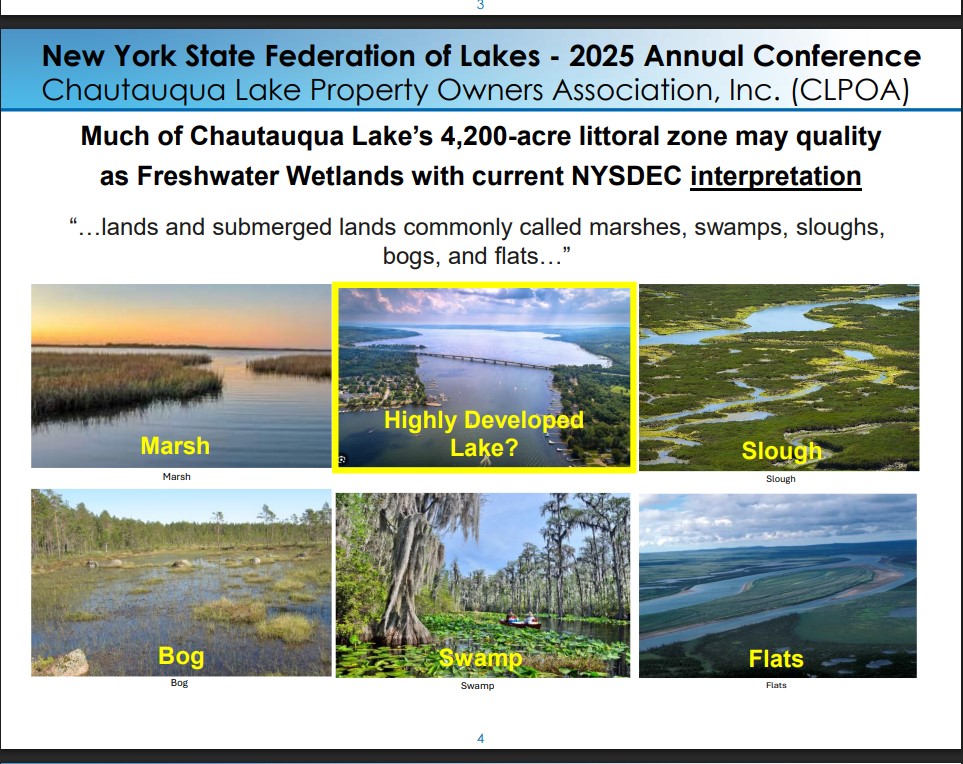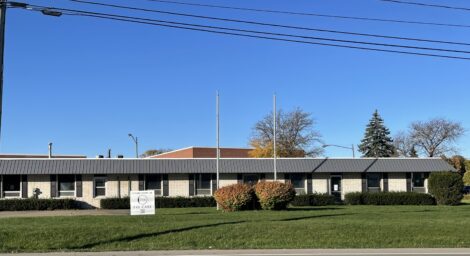CLPOA Updates Public On Lawsuit, Lake Status

A portion of a slideshow presented by the CLPOA during its community meeting on July 5, held at the Bemus Point Golf Club and Tap House, located at 72 Main St., from 9:30 to 11 a.m. Submitted photo
BEMUS POINT – The Chautauqua Lake Property Owners Association held its 11th public meeting to discuss the state Department of Environmental Conservation’s interpretation and implementation of the NYS Wetlands Act, fostering a lively dialogue on its impact on the local lakeside communities.
The topics discussed included an update on the CLPOA’s litigation against the 2022 wetlands legislation and regulations that took effect in January, a review of the DEC’s aggressive implementation of wetland regulations surrounding Chautauqua Lake, as well as progress on the long-awaited general permits, which are five months behind schedule; and an introduction to the new CLPOA website, highlighting its features and functionalities, along with other informational resources.
Jim Wehrfritz, president of the CLPOA, expressed his concerns during a slideshow briefing:
“While we support the identification and protection of wetlands in New York state, we are deeply worried about the NYSDEC’s proposed wetlands regulations being applied to areas we believe were not intended for such measures, particularly in lakes with developed shorelines. Chautauqua Lake spans 13,000 acres, is navigable, and has a history of over 150 years of shoreline development, along with hundreds of millions of dollars in private investments,” Wehrfritz said.
Wehrfritz noted that a significant portion of the littoral zone of Chautauqua Lake, which spans 4,200 acres, is likely to be classified as freshwater wetlands according to the state Department of Environmental Conservation’s current interpretation of the law and regulations.
“The Environmental Conservation Law defines a wetland as lands and submerged lands commonly called marshes, swamps, sloughs, bogs, and flats supporting aquatic and semi-aquatic vegetation of various defined types,” he said.
Wehrfritz elaborated on the goals of the CLPOA as they move forward.
“Our objectives include improving the 2022 amendments and the January 2024 wetland regulations, as well as examining appropriate regulations for Chautauqua Lake and its surrounding areas. We plan to conduct research through DEC document studies, meetings, webinars, and additional efforts. Open dialogue will be prioritized with property and business owners, lake users, DEC HQ staff, local officials, NYS lake organizations, municipalities, and county officials. We aim to educate the public by participating in governmental meetings, utilizing emails, media, and letters, and requesting feedback and comments from those in authority, as further needs arise,” he said.
Wehrfritz also provided The Post-Journal with a copy of a letter addressed to the Chautauqua County Legislature, dated June 25, 2025. In this letter, delivered during the Second Privilege of the Floor, he specifically criticizes the New York State Department of Environmental Conservation (NYS DEC) for undermining the integrity of the lake.
“You have all watched the DEC run roughshod over Chautauqua Lake, private property along the shoreline, and across the County with its new wetlands’ regulations. The county’s Chautauqua Lake “cash cow” is being devalued by New York State right in front of your eyes. Only five months into the regulations, over 3,000 acres have been designated as wetlands, with common activities restricted. That is 70% of the lake’s shallow water littoral zone and over 20% of our entire lake. Additionally, hundreds of acres of private property, extending 100 feet up onto the shoreline and under hundreds of homes, are now restricted. County Executive Wendel, please use your close relationship with DEC Region 9 Director O’Neill to identify what in the regulations allows the in-lake actions she has taken,” reads the letter in part.
In 2022, Governor Kathy Hochul signed revisions to New York’s Freshwater Wetlands Act. Originally enacted in 1975, this Act was designed to regulate activities near larger wetlands, specifically those exceeding 12.4 acres. Starting in 2025, the threshold will decrease to 7.4 acres by 2028. Additionally, the regulations will encompass smaller wetlands of significant local importance, which, as Wehfritz noted, include Chautauqua Lake and its watershed.
“Like I said before, there are several issues with how the state went about this -there are constitutional issues with this; if we need to go the federal route to protect our members’ rights, we will,” said Wehfritz in a May 22 Post-Journal story. “The wetlands regulations are not appropriate for a 13,000-acre lake with 150-plus years of shoreline development and hundreds of millions of dollars of private investment,”





